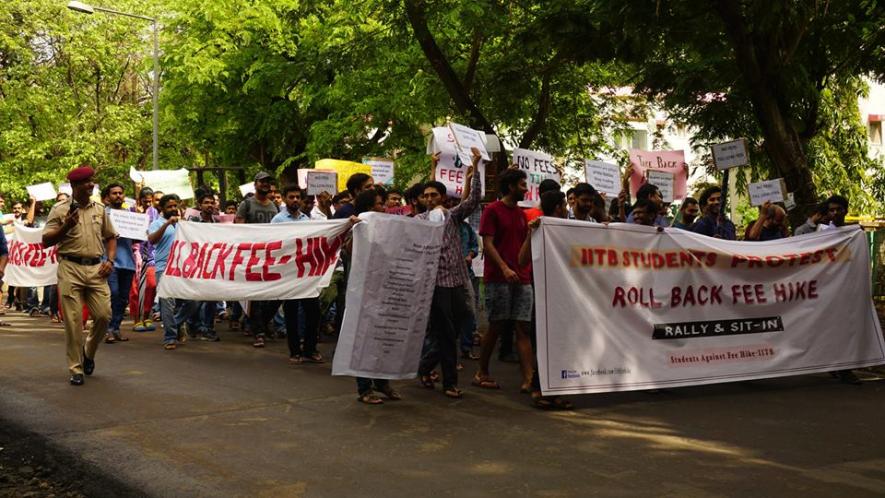IIT-Bombay Students Protest against Fee Hike aka "User Charges"

Students protesting at IIT-Bombay on June 22, 2017.
“Users have to pay for what they use”, said the director of the Indian Institute of Technology-Bombay (IIT-B), Devang Khakhar, last Thursday as he addressed students on campus protesting a massive hike in the semester fees announced this May.
Terming the hike as “user charges or service charges”, he made no bones about the neoliberal economic logic that treats education as any ‘goods or services’ bought and sold in the market — and violating the very basis on which the IITs were set up by the Indian government in the 1950s and 60s.
“The objective of the IITs was to provide a space that nurtures some of the brightest minds in the country, who’d contribute to India’s goals of scientific and technological development. Students are not consumers and colleges are not shops, at least not the government institutions,” said a PhD student at IIT-B, on condition of anonymity.
The latest hike at IIT-B comes a year after the undergraduate tuition fees was more than doubled across the IITs — the premier public-sector institutions of higher technical education and research.
This time, while tuition has not been hiked, there is an increase of 300% in the hostel rent, 167% in the gymkhana fees, 100% in exam, registration and medical fees, and 30-50% in other charges.
This means that all students—undergraduate, postgraduate and research; across categories—will need to pay an increased sum between Rs 4,750 and Rs 7,250 from the upcoming Autumn Semester onwards. But students have calculated that counting the end-semester mess overdue charges, those using hostel facilities will actually have to pay even more from the next (after Autumn) semester onwards—a hike of Rs 8,670 to 11,170 per semester.
For nearly two months now, IIT-B students have been organising on the campus, demanding rollback of the hike, which they’ve called “undemocratic” and “non-transparent” as no elected student body was consulted on the matter.
They’ve formed a collective called Students Against Fee Hike, IIT-B, sent emails and submitted representations to the administration. More than 700 students signed a petition opposing the fee hike—although the majority of students are currently not on campus, as the new semester begins mid-July
Yet, last Thursday, when the students finally gained an audience with the director after a 10-hour long protest rally and sit-in outside the main administrative building — he could only promise them a “white paper” explaining what costs the institute was trying to recover and why they were being passed on to students.
He also assured them of an Open House meeting soon where he’d address students’ questions, and said the administration would try its best to resolve the issue.
But Khakhar said the institute was just “falling in line” with “national policy”. He said since the tuition at IITs was already subsidised, subsidy was going to be cut for the apparently “non-academic” part of expenses, such as for living in the hostel, eating in the mess, using medical and sports facilities, etc.
Earlier, the administration had simply attributed the hike to “inflation”.
The director did not agree to extend the payment deadline, which is July 11, 2017 (with delayed payments allowed till July 19, against a fine of Rs 100 per day).
He said even if the fee was reduced, it would not go back to what it was earlier.
He added that “special provisions” could be made for those who could not afford the hike, although that is likely to be a one-time affair.
For now, the protests are on hold, but students plan to resume and intensify the agitation if they do not hear back favourably from the director soon.
A PhD student, who is an active member of the Students Against Fee Hike, IIT-B collective, said, “We are waiting for an email from the director, as promised. We want to the issue to be resolved as soon as possible, as the fee payment deadline is approaching fast. Otherwise we will resume the protests this week.”
Less than 10 years ago, the annual tuition fees for undergraduate courses at the IITs used to be Rs 25,000.
Under the UPA, the fee was doubled to Rs 50,000 per annum in 2008, and then hiked to Rs 90,000 per annum in 2013.
Last year, the Modi-led NDA approved a steep hike from Rs 90,000 to Rs 2 lakh per year, with fee waivers for reserved category and sections of economically weak students.
For the rest, loan facilities were brandished as the solutions. There was some talk of interest-free loans for IIT students, not for those of other engineering institutions, such as the NITs, which also faced a massive fee hike from Rs 70,000 to Rs 1.25 lakh last year.
This means that in order to access quality higher technical education, even from the institutions set up by the government, students need to be either wealthy or indebted. And we only need to look at the U.S. to know how dire and vicious student debt cycles can get.
Even the 2016 hike came after the MHRD revised downwards the original hike recommendation which was Rs 3 lakh, made by a panel headed by Ashok Mitra, chairman of the Board of Governors of IIT-Roorkee.
In 2011, the Kakodkar Committee, headed by nuclear scientist Anil Kakodkar, had recommended that tuition fees for all undergraduate, postgraduate and research programmes be hiked to Rs 2-2.5 lakhs per annum.
But while the UPA did not accept the Kakodkar Committee recommendation to hike fees so steeply all at once, the IIT Council did officially declare that “the fee may be revised periodically”.
This push to turn the IITs into “self-financing” institutions—with the government throwing its hands up by saying it already spends around Rs 6 lakh on each IIT student per year—is accompanied by selling out initiatives like the
Higher Education Financing Agency, which will basically borrow from the debt market and lend to the institutions for “infrastructure” development, requiring the institutes to pay back the principal amount. This will again lead to hike in the student fees.
Last December, IIT Kharagpur saw students protest against a hike of more than Rs 8,000 in the fees. Students even gheraoed the officials, including the director, inside their offices for around 17 hours. Finally, the
administration agreed to a partial rollback.
Get the latest reports & analysis with people's perspective on Protests, movements & deep analytical videos, discussions of the current affairs in your Telegram app. Subscribe to NewsClick's Telegram channel & get Real-Time updates on stories, as they get published on our website.
























